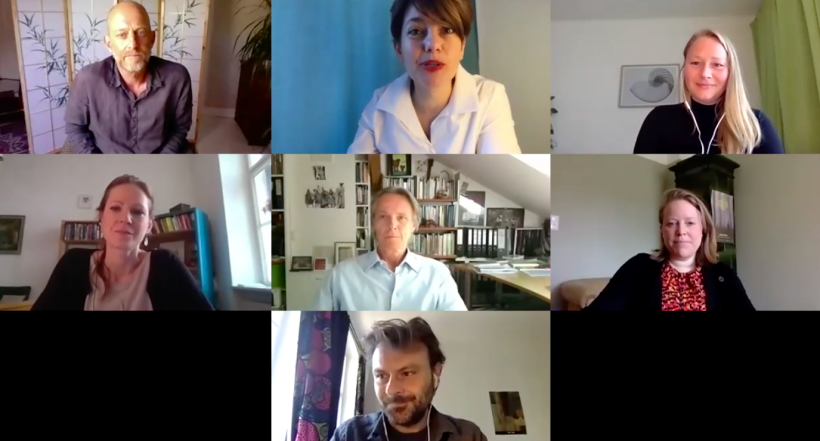During the COVID-19 lockdowns in the spring of 2020, when cinema theatres and university buildings closed, many film festivals decided to move their activities online. This moment of experiment with digital infrastructures exposed filmmakers and audiences to new possibilities for viewing and discussing films. Among anthropological filmmakers and festival organizers, it also led to renewed discussions about the longer-term project of sharing anthropological knowledge with varied publics, and the specific role of film festivals in curating, exhibiting and promoting anthropological cinema. What are the implications of moving these activities online? This was discussed during an online event of the ethnocineca International Documentary Film Festival Vienna on May 8, 2020, organised in collaboration with the Vienna Visual Anthropology Lab. The participants of this discussion were anthropologists who are also filmmakers or operate in the professional field of film distribution as festival organisers: Marie-Christine Hartig, Andy Lawrence, Katja Seidel, Christos Varvantakis, and Werner Zips (alongside the authors). The discussion is summarised below, as a starting point for further conversations about the future of anthropological film.
What is distribution?
This online round table discussion was organised as part of the Vienna node of the #Distribute 2020 conference. Taking the #Distribute conference theme as a starting point, each speaker started with sharing their views on what “distribution” is or should be, from their perspective. They agreed on a view of distribution as “sharing”, rooted in values of (non-hierarchical) exchange. Katja Seidel, co-director of ethnocineca in Vienna and senior postdoctoral researcher at Maynooth University, indicated that
“to me, distribute means to share something among people: to exchange stories and images and to enable the possibility to engage collectively. Rather than looking at distribution as a neoliberal idea in a capitalist market-oriented sense of the term, with an assumed centre from which knowledge, images or ideas are disseminated, I understand distribution as a non-linear process of circulation. (…). To me distribution therefore means to open up a space for conversations, critical thinking and mutual learning. Such an approach to films is also the motivational force behind our festival.”
Ethnocineca co-director Marie-Christine Hartig agreed that distribution implies interaction, “and with interaction also comes responsibility.” While all film festivals play an important role in the distribution chain of documentary film,
“ethnographic film festivals may take this responsibility even more serious, because when we talk about inequalities in the world, whose stories are we sharing? Whose stories are told, by whom? Whose stories are not common in the media at the moment? Issues that are considered as well when selecting the films.”
Distribution is “a system of exchange” in which things acquire value through their movement and the social interactions that guide it.
A recurrent theme in the discussion was power inequality. Christos Varvantakis, from the Athens Ethnographic Film Festival (Ethnofest), sees distribution as collaboration and highlighted the need for promoting collaborations with a critical perspective on inequalities produced by global capitalism. Andy Lawrence, from the University of Manchester, took inspiration from Marcel Mauss’ book The Gift (1924) to argue that distribution is “a system of exchange” in which things acquire value through their movement and the social interactions that guide it. Viktoria Paar, student at the University of Vienna and filmmaker, suggested that “it is very important to distribute from a low threshold, and not from a central authority, to create equal rights and actually to ultimately preserve human rights.”
For Werner Zips, professor at the University of Vienna and filmmaker, ethical considerations play a major role in distribution, but in a different way than is often highlighted by anthropologists. While anthropologists tend to highlight introspective ethical reflection (e.g. about their relations with the film participants), a much less discussed ethical problem is the control of national entities, police, or even secret services over the work of researchers and filmmakers. The privileged European anthropologist is perhaps rarely exposed to consequences, but many people can be threatened with dire consequences if they are seen as resisting a regime:
“The official procedures involving content control and intelligence clearance had a major impact of most of my film projects for the past few years. Many states have considerably stepped up their requirements for official permissions. Various forms of message control affected the final editing and framing of results. This is even more problematic when indigenous peoples or minority groups in my film projects are under critical surveillance and state heteronomy.”
A much less discussed ethical problem is the control of national entities, police, or even secret services over the work of researchers and filmmakers.
Changing film festivals
The round table focussed on film festivals as a specific format for screening anthropological cinema. Film festivals have long been a venue for the curation, exhibition, and promotion of films produced by anthropologists. They have functioned as platforms for selecting and evaluating films, seeing and discussing films, and for building communities and creating social encounters (Peirano and Vallejo 2017, 3). Due to their peculiar position outside the walls of academia yet closely linked with the discipline of Visual Anthropology, festivals have been somewhat ambivalent spaces (Ginsburg 1998), operating as a bridge between anthropologists and various other kinds of storytellers and audiences.
If the technological infrastructures in which film festivals operate have always been dynamic, the COVID-19 lockdowns were paired with particularly rapid changes as festivals responded by going online, often in a hurried way. To discuss these changes, we discussed a question posed by Faye Ginsburg in the preface of the book Film Festivals and Anthropology (by Peirano and Vallejo 2017, xv): what happens to the festival as we move forward into a future of new technologies, which raise their own intellectual, ethical and practical challenges?
Outside the walls of academia, yet closely linked with the discipline of Visual Anthropology, festivals have been somewhat ambivalent spaces.
The speakers emphasised the public role film festivals have in the cities where they are organized. Through both films and side programmes, festivals connect anthropologists, filmmakers, and other audiences – these encounters also enable the sharing anthropological ideas and knowledge outside academia. At ethnocineca in Vienna, Hartig explains,
“we always start the festival with a keynote lecture by invited scholars, to show what the discipline of Visual Anthropology has to offer in terms of contemporary thoughts and issues. This is always free of charge, and as the festival attracts a wider audience, not only scholars and academics come.”
The Athens Ethnofest, Varvantakis adds, has started screening films on new topics such as “work”, “precarity” or “gentrification”, which are highly relevant to the city of Athens. This offered an opportunity to contribute an anthropological perspective to ongoing discussions in the city. As a student-filmmaker, Paar appreciates this, stating,
“we can say that film festivals in this form can bridge the distance. And in my eyes, that is a topic of anthropology. Now more than ever anthropology has the task of building bridges to make it possible to understand the processes and phenomena in the world”.
Due to these functions of accessibility, networking and community building, and interaction with local publics, the idea of going online with the festival was discussed with some cynicism. “We cannot transform film festivals to online formats so easily,” Varvantakis pondered. While the idea of an online festival is discussed in Athens, he worries what that would mean for the function of the festival in establishing social cohesion among visual anthropologists. Especially “for younger filmmakers: to let their films being screened and discussed and being in a community, which is caring and provides support.”

The social aspect of the festival was also underscored by filmmaker and film producer Andy Lawrence:
“I like to observe people watching films, especially the films I have made myself. I understand more about a subject as private fieldwork encounters are made public through cinematic viewing. Vulnerabilities are shared as we place ourselves and co-fieldworkers on a screen in front of audiences, who blink in unison or avert their gaze from uncomfortable scenes. There is something that profoundly connects us when we tune in personally and share collectively, where the experience of the protagonists of our films, our experience as filmmakers, and the experience of the cinema audience somehow merge and mix – this is most intense in the cinema.”
The viewing experience helps to shape people’s understanding of a film: “As a maker who attends film festivals this absolutely affects me, and my presence at the event also impacts on how the audience remember the occasion,” Lawrence added.
The idea of going online with the festival was discussed with some cynicism.
These and other longings for the cinema hall were triggered by our inability to watch and discuss films together during this first online edition of the ethnocineca festival. As a result of social distancing regulations, each of us was Zooming in from our living room, and we lamented not being able to continue the discussion informally afterwards, in the foyer or at the bar.
It was amidst these longings for the theatre that we reflected on the online futures of anthropological film: “We are in front of historical possibilities,” Varvantakis stated, as film festivals and related institutions can now build on their know-how to support the development of democratic and decentralised digital infrastructures: “The available technologies should go together with the ethics of open access and of collaboration.” In the online future of distribution, festival directors will “go green to take responsibility for the climate” (Hartig) and “continue pushing the quality of ethnographic film, multi-perspectivity, and establishing spaces for reflection” (Seidel). Zips added in agreement that we should not play one medium against another when reaching out to non-specialised publics and filmmaking partners: “I think we should have complementary means to reach a wider audience.”
What, then, is the future of anthropological film distribution? Online will stay. Experiment will be the norm. And as this moment of longing for the cinema hall becomes a memory, it becomes a reminder of the need to cherish spaces for exchange, discussion, and shared experience.
Further discussions about the online future of anthropological films are planned at the RAI Film Festival Conference, 25-28 March 2021, in the panel “Rethinking anthropological film distribution: radical sharing beyond the crisis”.
Featured Image
References
Ginsburg, Faye. 1998. “Institutionalizing the Unruly: Charting a Future for Visual Anthropology.” Ethnos 63 (2): 173-196.
Mauss, Marcel. 1990. The Gift: The Form and Reason for Exchange in Archaic Societies. London: Routledge.
Vallejo, Aida and María Paz Peirano (editors). 2017. Film Festivals and Anthropology. Newcastle: Cambridge Scholars Publishing.
Note:
Some of the quotes that appear in this article have been slightly edited in consultation with the speakers.






